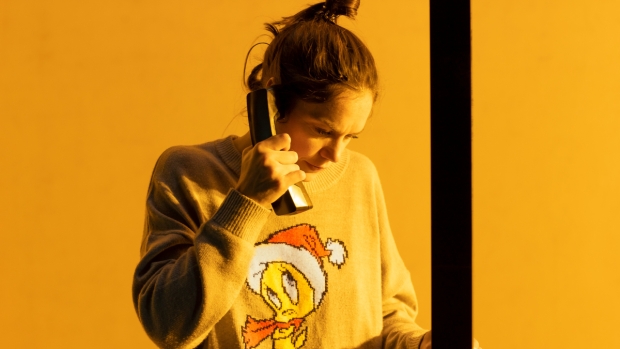The Human Voice review – Ruth Wilson is at the end of the line in West End drama
Ivo van Hove directs the solo show

© Jan Versweyveld
We don't know if there's actually anyone on the other end of the line. It's a thought that clattered throughout the mind as Ruth Wilson, alone on stage, dragged herself through a torturous one-sided phone call – while her long-term boyfriend is apparently breaking up with her.
Ivo van Hove's adaptation of Jean Cocteau's 1930 play is a piece that gives about as much as you're ready to put into it. Is it all a fantasy? Is it an astute deconstruction of the way in which a break-up can be a destruction of the self as much as the end of a relationship? Does it matter either way?
Notably, van Hove first staged his version of the piece in 2009 (it's having something of a moment – a short film, directed by Pedro Almodóvar, was released last year). Thirteen years is an artistic lifetime for a director who has since brought an award-winning performance out of news-room confined Bryan Cranston on the National stage, and radically transformed West Side Story into a video-laden kaleidoscope. That's before you mention his immense body of work in Amsterdam.
None of these technical bells and whistles are present here – Wilson is in a blank box on stage, a large, sliding French window dividing her from us. Lighting states subtly alter, but for the most part, you get what you see.
The main draw, and main success, of the piece is undoubtedly the performance from the Luther star (reuniting after their take on Hedda Gabler six years ago at the National). She performs as only she can – flickering between well-composed surety and adolescent piteousness in the flicker of an eyebrow. Cringe-worthy coos become excruciating cries. She commands the stage with what at times feels like utter disregard – as if presenting a show in spite of her audience. All that matters is the man that might, or might not, be on the other end of the line. Beyond a pair of discarded men's shoes, pristine and perhaps unused, there is no evidence he even existed.
We get very few answers in a 70-minute text that touches on a whole wealth of topics – the way in which, for example, breaking up with a loved one means they enter a paradoxical state – simultaneously known and unknowable. Unconditional love becomes unrequited love. But, reaching 90 years old, Cocteau's central thesis feels dated – a woman cast adrift by a man may not be able to find herself again – and for all of Wilson's brilliant, internalised self-reflection, that conceptual notion can be a tough pill to swallow.
Where the choices are being made, some of them are fantastic (one moment, where Wilson sits like an abandoned marionette doll for multiple minutes, is particularly audacious). Others are bewildering (we won't tarry too long on a Miley Cyrus performance). The show has been labelled monochromatic – which feels unjust – the way in which Jan Versweyveld's design brings ice-cold, desaturated white light across to a warm glow on a single canvas proves how, even in the heat of a break-up, the cold reality of the next morning can bite.













